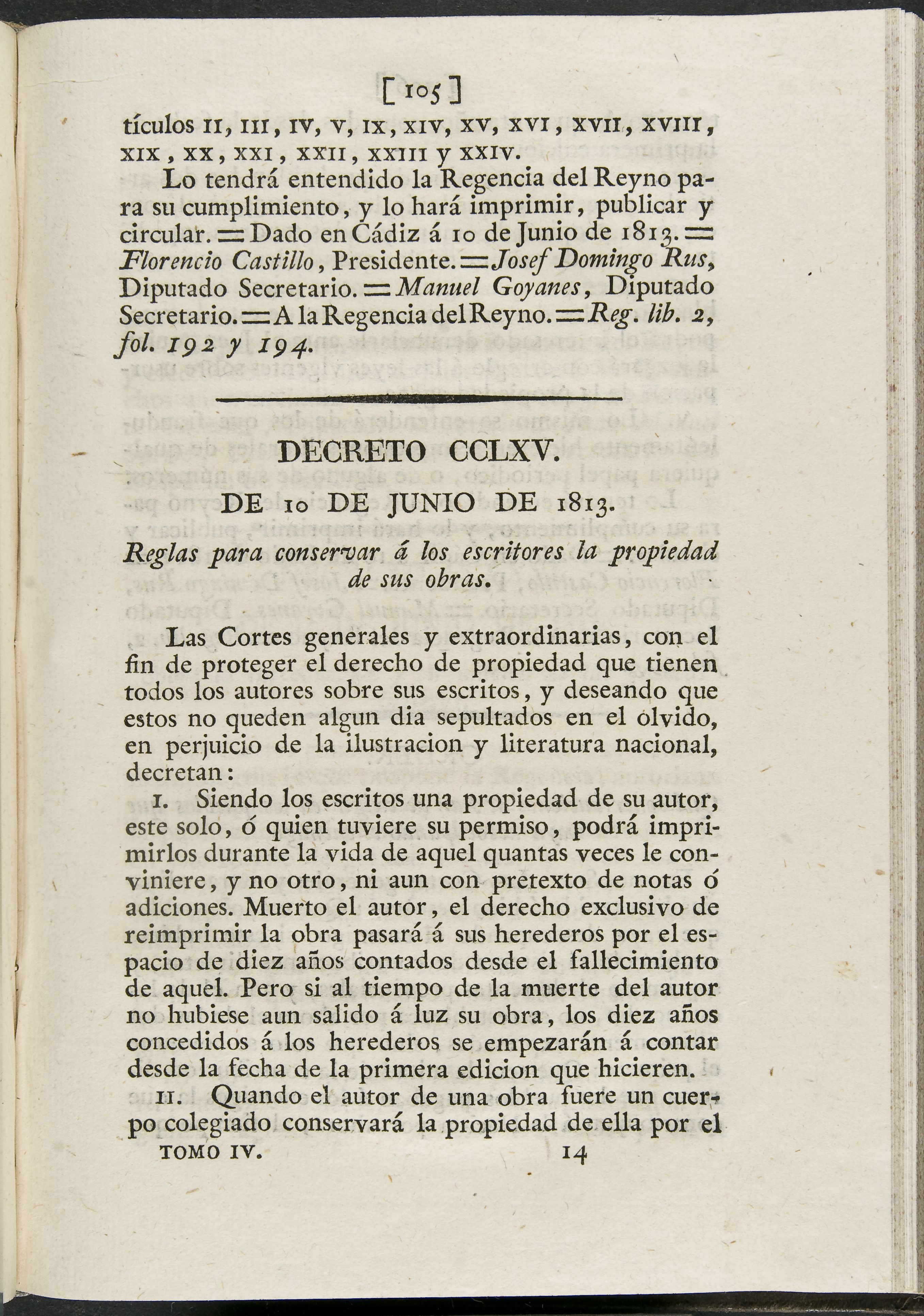Browse Documents By...
Original Language...
Documents For...
Browse Commentaries By...
Browse Referred Persons By...
Rules to preserve the property of authors over their works, Madrid (1813)
Source: Biblioteca Nacional de España (BNE, Signature: U/10282 V.4) from Colección de los decretos y órdenes que han expedido las Cortes Generales y Extraordinarias, Volume 4, 1813, (Spain) pp. 105-106
Citation:
Rules to preserve the property of authors over their works, Madrid (1813), Primary Sources on Copyright (1450-1900), eds L. Bently & M. Kretschmer, www.copyrighthistory.org
Back | Record | Images | No Commentaries
Translation only | Transcription only | Show all | Bundled images as pdf
[105]
DECREE CCLXV.
10 JUNE 1813.
Rules to preserve the property of authors
over their works.
The general and extraordinary Cortes,
aiming to protect the property right that all authors
have over their writings, and wishing that these
will never be forgotten, then prejudicing
the national Enlightenment and literature,
decrees:
I. Since writings constitute a property of its
author, such author alone, or whoever may have his
consent, shall be able to print them for the author's
life as many times at his convenience, and no one
else may print them, not even those with the excuse
of annotating or adding something to it. When the
author dies, the exclusive right to print will pass to
his heirs for ten years from his death. However, if the
work had not been published when the author dies,
those ten years granted to the heirs shall be counted
from the date in which they did the first edition.
II. When the author of a work is a corporation,
the corporation shall retain the property
[105]
DECRETO CCLXV.
DE 10 de JUNIO DE 1813.
Reglas para conservar á los escritores la propiedad
de sus obras.
Las Cortes generales y extraordinarias, con el
fin de proteger el derecho de propiedad que tienen
todos los autores sobre sus escritos, y deseando que
estos no queden algun dia sepultados en el olvido,
en perjuicio de la ilustracion y literatura nacional,
decretan:
I. Siendo los escritos una propiedad de su autor,
este solo, ó quien tuviere su permiso, podrá impri-
mirlos durante la vida de aquel quantas veces le con-
viniere, y no otro, ni aun con pretexto de notas ó
adiciones. Muerto el autor, el derecho exclusivo de
reimprimir la obra pasará á sus herederos por el es-
pacio de diez años contados desde el fallecimiento
de aquel. Pero si al tiempo de la muerte del autor
no hubiese aun salido á luz su obra; los diez años
concedidos á los herederos se empezarán á contar
desde la fecha de la primera edicion que hicieren.
II. Quando el autor de una obra fuere un cuer-
po colegiado, conservará la propiedad de ella por el
Source: Biblioteca Nacional de España (BNE, Signature: U/10282 V.4) from Colección de los decretos y órdenes que han expedido las Cortes Generales y Extraordinarias, Volume 4, 1813, (Spain) pp. 105-106
Citation:
Rules to preserve the property of authors over their works, Madrid (1813), Primary Sources on Copyright (1450-1900), eds L. Bently & M. Kretschmer, www.copyrighthistory.org
Back | Record | Images | No Commentaries
Translation only | Transcription only | Show all | Bundled images as pdf
[105]
DECREE CCLXV.
10 JUNE 1813.
Rules to preserve the property of authors
over their works.
The general and extraordinary Cortes,
aiming to protect the property right that all authors
have over their writings, and wishing that these
will never be forgotten, then prejudicing
the national Enlightenment and literature,
decrees:
I. Since writings constitute a property of its
author, such author alone, or whoever may have his
consent, shall be able to print them for the author's
life as many times at his convenience, and no one
else may print them, not even those with the excuse
of annotating or adding something to it. When the
author dies, the exclusive right to print will pass to
his heirs for ten years from his death. However, if the
work had not been published when the author dies,
those ten years granted to the heirs shall be counted
from the date in which they did the first edition.
II. When the author of a work is a corporation,
the corporation shall retain the property
[105]
DECRETO CCLXV.
DE 10 de JUNIO DE 1813.
Reglas para conservar á los escritores la propiedad
de sus obras.
Las Cortes generales y extraordinarias, con el
fin de proteger el derecho de propiedad que tienen
todos los autores sobre sus escritos, y deseando que
estos no queden algun dia sepultados en el olvido,
en perjuicio de la ilustracion y literatura nacional,
decretan:
I. Siendo los escritos una propiedad de su autor,
este solo, ó quien tuviere su permiso, podrá impri-
mirlos durante la vida de aquel quantas veces le con-
viniere, y no otro, ni aun con pretexto de notas ó
adiciones. Muerto el autor, el derecho exclusivo de
reimprimir la obra pasará á sus herederos por el es-
pacio de diez años contados desde el fallecimiento
de aquel. Pero si al tiempo de la muerte del autor
no hubiese aun salido á luz su obra; los diez años
concedidos á los herederos se empezarán á contar
desde la fecha de la primera edicion que hicieren.
II. Quando el autor de una obra fuere un cuer-
po colegiado, conservará la propiedad de ella por el





